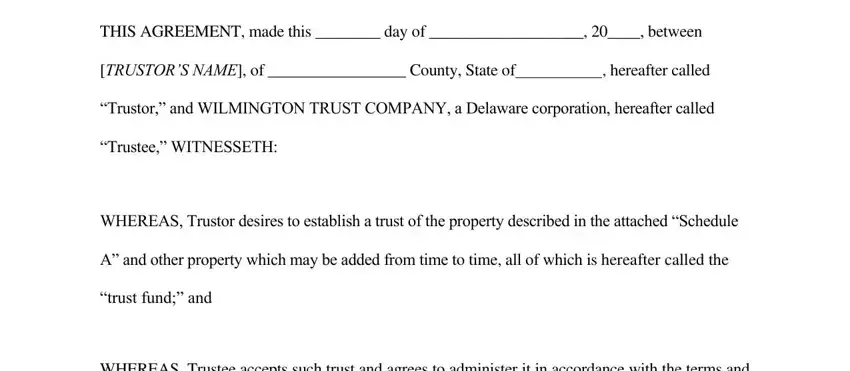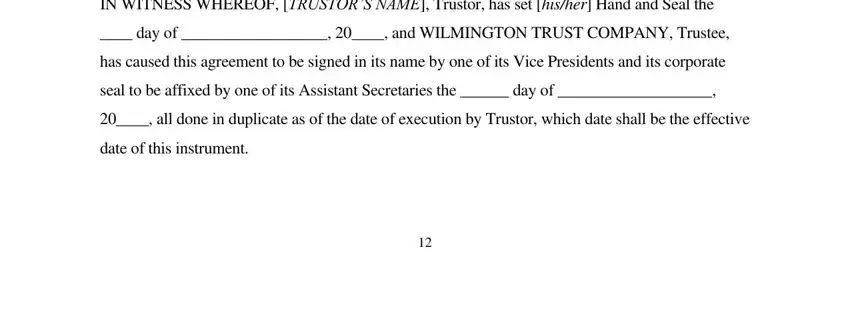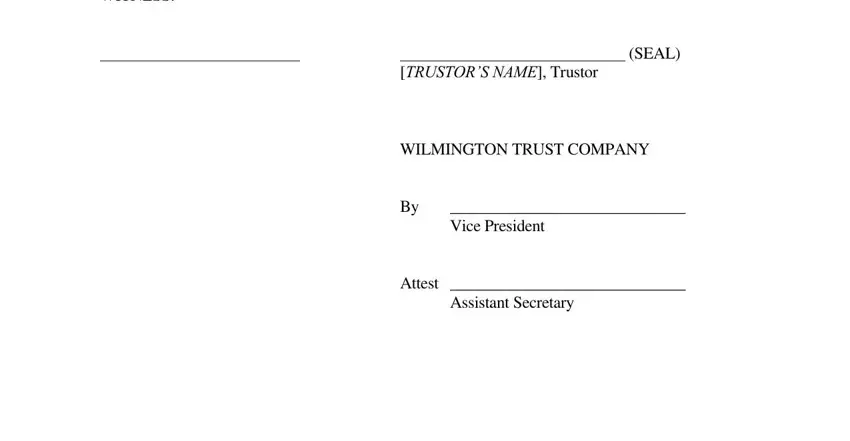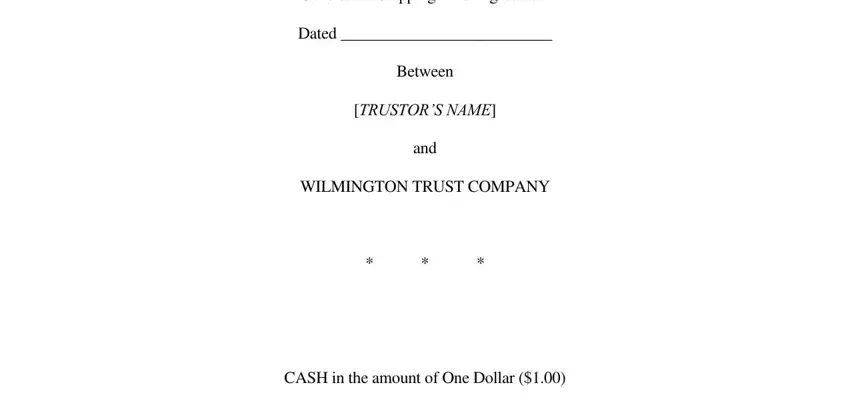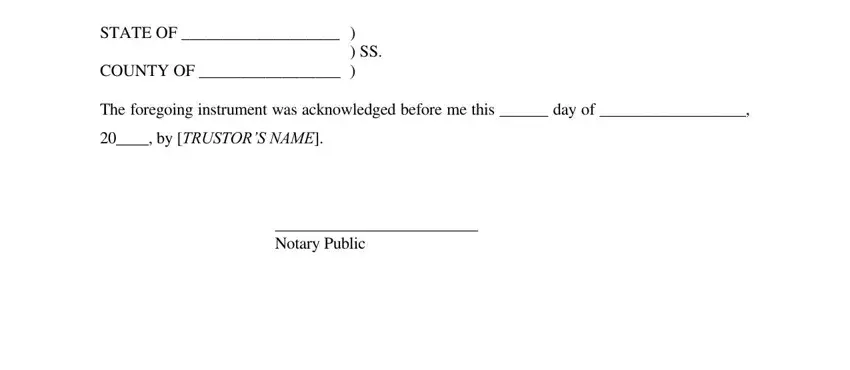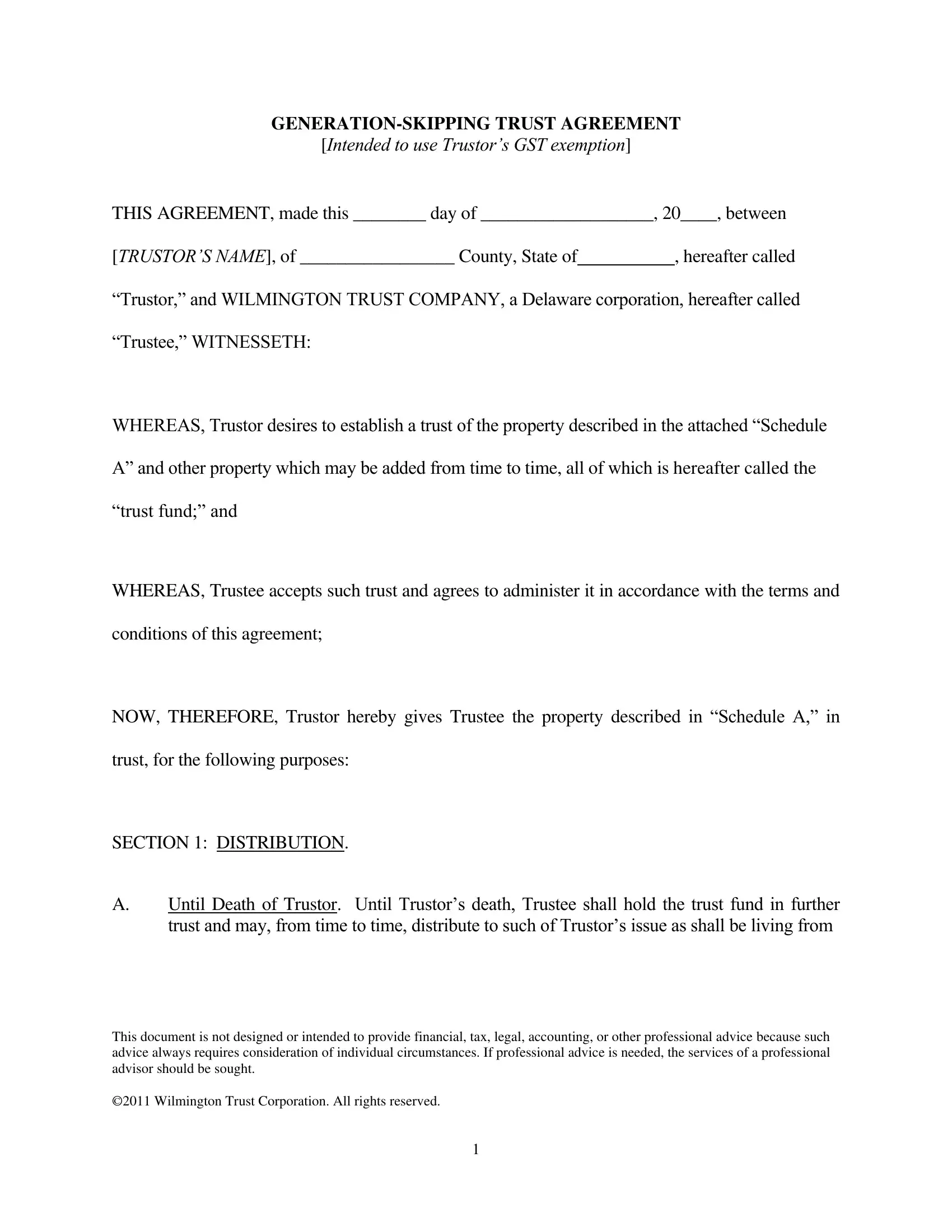GENERATION-SKIPPING TRUST AGREEMENT
[Intended to use Trustor’s GST exemption]
THIS AGREEMENT, made this ________ day of ___________________, 20____, between
[TRUSTOR’S NAME], of _________________ County, State of, hereafter called
“Trustor,” and WILMINGTON TRUST COMPANY, a Delaware corporation, hereafter called “Trustee,” WITNESSETH:
WHEREAS, Trustor desires to establish a trust of the property described in the attached “Schedule A” and other property which may be added from time to time, all of which is hereafter called the
“trust fund;” and
WHEREAS, Trustee accepts such trust and agrees to administer it in accordance with the terms and conditions of this agreement;
NOW, THEREFORE, Trustor hereby gives Trustee the property described in “Schedule A,” in trust, for the following purposes:
SECTION 1: DISTRIBUTION.
A.Until Death of Trustor. Until Trustor’s death, Trustee shall hold the trust fund in further trust and may, from time to time, distribute to such of Trustor’s issue as shall be living from
This document is not designed or intended to provide financial, tax, legal, accounting, or other professional advice because such advice always requires consideration of individual circumstances. If professional advice is needed, the services of a professional advisor should be sought.
©2011 Wilmington Trust Corporation. All rights reserved.
1
time to time all, some, or none of the net income and/or principal in such amounts and proportions (whether equally or unequally, and even to the exclusion of one or more beneficiaries) as Trustee, in its sole discretion, deems appropriate, after taking account of all other sources of funds available to them. Trustee shall accumulate any net income not so distributed and add it to principal at least annually, to be disposed of as a part of it. No such
distribution shall be deemed to be an advancement, and no such distribution shall be made that would discharge anyone’s legal obligation to support any of such issue.
B.On Death of Trustor. On Trustor’s death, Trustee shall divide the assets then held hereunder into shares for Trustor’s then living issue, per stirpes, and administer and distribute such shares according to the provisions of Subsection C of this Section 1.
C.Shares Held for Issue. Trustee shall hold each share set aside for an issue of Trustor in further trust for such issue, referred to hereafter in this Subsection C as the “beneficiary.”
(1)During the Beneficiary’s Life. During the beneficiary’s life, Trustee may, from time to time, distribute to the beneficiary and his or her issue all, some, or none of the net income and/or principal in such amounts and proportions (whether equally or unequally, and even to the exclusion of one or more beneficiaries) as Trustee, in its sole discretion, deems appropriate, after taking account of all other sources of funds available to them. Trustee shall accumulate any net income not so distributed and add it to principal at least annually, to be disposed of as a part of it. No such
distribution shall be deemed to be an advancement, and no such distribution shall be made that would discharge the beneficiary’s legal obligation to support any of such issue.
(2)On the Death of the Beneficiary. On the death of the beneficiary, Trustee shall distribute so much of the beneficiary’s share as is then held hereunder, free from this trust, to such of Trustor’s issue (other than the beneficiary) and the spouses of such issue (including the beneficiary’s spouse), in such manner and amounts, and on such terms, whether in trust or otherwise, as is effectively appointed by specific reference hereto in the last written instrument which the beneficiary executes and delivers to Trustee during his or her lifetime or, failing any such instrument, in his or her Will. However, the beneficiary may not appoint any more than an income interest to his or her spouse or to a spouse of any other issue of Trustor. Before the beneficiary
exercises this limited power of appointment, he or she should consider Section 2041(a)(3) of the Code and 25 Delaware Code Sections 501–505, as amended, or any corresponding Delaware statutes enacted after the date of this agreement.
On the death of the beneficiary, Trustee shall divide the balance of the beneficiary’s share, to the extent not effectively appointed, into further shares for his or her then living issue, per stirpes, but if no such issue is then living, then for the then living
2
issue, per stirpes, of the closest ascendant of the beneficiary who was an issue of
Trustor and who has then living issue, but if no such issue is then living, then for
Trustor’s then living issue, per stirpes. Trustee shall hold each share set aside pursuant to the preceding sentence in further trust under the provisions of this Subsection C. Any share set aside for an issue of Trustor for whose benefit a share is then held in trust under the provisions of this Subsection C shall be distributed to the Trustee of such share, to be added to its principal and disposed of as a part of it.
D.Perpetuities Savings Clause. Notwithstanding the foregoing provisions, unless sooner terminated in the manner previously provided, each trust held hereunder shall end in its entirety or with respect to certain of its assets on the date, if any, required by the Delaware rule against perpetuities. Thereupon, Trustee shall distribute the principal of such trust or such assets, as the case may be, free from trust, to the beneficiary for whom the trust was set aside.
E.Failure of Issue. If, at any time, Trustee holds any portion of the principal of the trust fund not disposed of effectively under the previous provisions, then, at such
time, Trustee shall distribute such principal, free from trust, to such then living person or persons as are then determined to be Trustor’s distributees by the application of the intestacy laws of the State of Delaware governing the distribution of intestate personal property then in effect, as though Trustor had died at that particular time, unmarried, intestate, a resident of the State of Delaware, and owning such property then so distributable.
SECTION 2: MINORITY OR OTHER INCAPACITY.
If any property is otherwise required to be distributed to a beneficiary who has not attained age twenty-five (25) or is, in Trustee’s opinion, unable to manage funds due to illness or infirmity,
Trustee may:
A.Distribute such property to such beneficiary himself or herself; or
B.Apply such property for the benefit of such beneficiary; or
C.Hold the property not so distributed or applied in a separate trust hereunder for the benefit of such beneficiary and distribute or apply the net income and principal thereof as provided in Subsections A and B hereof.
Trustee shall distribute the property in such trust to such beneficiary upon his or her attaining age twenty-five (25) or upon the termination of his or her incapacity (as the case may be). If the
3
beneficiary dies prior to such distribution, Trustee shall distribute the property to such beneficiary’s estate.
SECTION 3: MERGER WITH SIMILAR TRUSTS.
If, at any time, a trust is set aside for any person or persons under the terms of this agreement which is substantially the same as any other trust established for that person or persons, Trustee may, in its sole discretion, merge the trust created hereunder with the other trust for such person or persons, and the two trusts shall thereafter be held, administered, and distributed as one. However, Trustee shall
not combine any trust having an inclusion ratio, as defined in Section 2642 of the Code (hereafter “inclusion ratio”), of other than zero (0) with a trust having an inclusion ratio of zero (0).
SECTION 4: ALTERNATIVE METHODS OF DISTRIBUTION.
Trustee may take any reasonable steps to disburse funds to or for a beneficiary, including: (i) distribution, either by hand or mail, to the beneficiary or the guardian of the person or property (whether the guardian is formally appointed or a natural guardian), (ii) distribution to a custodian for the beneficiary under the Uniform Transfers to Minors Act (or similar statute) of any state, (iii) deposit to the account of the beneficiary in any federally insured depository, (iv) direct application for the benefit of the beneficiary, or (v) distribution to a new or existing trust for the beneficiary.
SECTION 5: SPENDTHRIFT PROVISION.
A beneficiary may not alienate or in any other manner assign or transfer his or her interest in any trust hereunder, and no one (including a spouse or former spouse) may attach or otherwise reach any interest of any beneficiary hereunder to satisfy a claim against that beneficiary, whether the claim is legal or equitable in origin. The provisions of this Section shall not limit or otherwise affect any power of appointment conferred upon a beneficiary or the right of a beneficiary to disclaim or release any interest created hereunder.
SECTION 6: TRUSTEE’S POWERS.
In addition to those powers granted by law, Trustee is specifically authorized and empowered, in its sole discretion, but subject to the provisions of Sections 7 and 10:
4
A.To sell at public or private sale, exchange for like or unlike property, convey, lease for terms longer or shorter than the trust, and otherwise dispose of any or all property held hereunder, for such price and upon such terms and credits as it deems proper.
B.To invest in any kind of property, real, personal, or mixed, regardless of the laws governing investments by fiduciaries, without any duty to diversify investments.
C.Unless otherwise directed by the investment adviser named in Section 7 hereof, to execute securities transactions, without necessity of providing written confirmation thereof to such adviser at the time of settlement, and to execute securities transactions through any brokerage service, whether discount or full service, including Wilmington Brokerage Services, at its normal rates of compensation, without diminution of compensation otherwise payable to Trustee, even if Wilmington Trust Company is serving as Trustee.
D.To vote directly or by proxy at any election or stockholders’ meeting any shares of stock, including stock of Wilmington Trust Corporation, even if Wilmington Trust Company is serving as Trustee.
E.To participate in any plan or proceeding, including any voting trust plan for liquidating, protecting, or enforcing any interest in any property, or for reorganizing, consolidating, merging, or adjusting the finances of any corporation issuing any such interest; to accept in lieu thereof any new or substituted stocks, bonds, notes, or securities, whether of the same or a different kind or class, or with different priorities, rights, or privileges; to pay any assessment or any expense incident thereto; and to do any other act or thing that it deems necessary or advisable in connection therewith.
F.To deposit, or arrange for the deposit of, securities at Depository Trust Company (DTC) and/or at any other securities depository or clearing corporation.
G.To make any division or distribution in cash or in kind or partly in cash and partly in kind; to make reasonable valuations of the property so divided or distributed; and to elect to recognize taxable gain or loss resulting from a distribution. Trustee may consider the income tax basis of the property then available for division or distribution, as well as the circumstances of the beneficiaries, and need not make division or distribution on a pro rata, asset-by-asset basis. Trustee shall not adjust the interest of any beneficiary as a result of any action taken or forborne under the provisions of this Subsection G.
H.To make loans, against adequate collateral, to the Personal Representative of the estate of any beneficiary and/or to purchase any property belonging to his or her estate.
5
I.To borrow money, extend loans, pledge assets, and provide guarantees for any purpose connected with the protection, preservation, or improvement of the trust estate whenever in its judgment advisable, and as security to pledge any real or personal property forming a part of the trust estate upon such terms and conditions as it may deem advisable.
J.To litigate, submit to arbitration, compromise, or settle any claim in favor of or against any trust hereunder, and to execute all agreements, deeds, and releases necessary or proper in connection therewith. However, Trustee need not institute any suit or proceeding unless its expenses, including counsel fees and costs, are available in the trust fund or are advanced or guaranteed in an amount and in a manner reasonably satisfactory to it.
K.To retain attorneys-at-law, accountants, investment counsel, agents, and other advisers and to pay all compensation and other costs associated therewith from the trust without diminution of compensation otherwise payable to Trustee.
L.To pay the taxes and expenses of maintaining, repairing, improving, and insuring any real property held hereunder.
M.Except as otherwise provided, to determine whether receipts and disbursements, including its commissions, are allocable or chargeable to income or principal.
N.To renounce, in whole or in part, any property or interest in property which may become payable to any trust hereunder (including the renunciation of any proceeds from any pension, profit-sharing, or other employee benefit plan payable to any trust hereunder), except to the extent that the distribution of such property resulting from such renunciation is fundamentally inconsistent with the provisions of this agreement.
O.To divide any trust hereunder into separate trusts if the purposes for which the trust was created are better served thereby.
P.To take such actions as are necessary to cause gains from the sale or exchange of trust assets (as determined for federal income-tax purposes) to be taxed for federal income-tax purposes as part of a distribution of principal to a beneficiary.
Q.To invest in any closely held company, limited-liability company, or partnership, or in any successor entity, and to purchase additional interests in any such entity, even though, as a result, such trust is invested largely or entirely in such entity.
6
R.To settle its accounts judicially or nonjudicially at any time and from time to time and to pay all of its counsel fees and costs associated therewith from the trust without diminution of compensation otherwise payable to Trustee.
SECTION 7: INVESTMENT ADVISER.
Trustee shall exercise the powers hereinbefore granted to it in Subsections A, B, D, E, I, and Q of Section 6 with respect to each trust hereunder only with the written consent or on the written direction of the investment adviser of such trust, provided that: (i) Trustee shall sell any Wilmington Trust Corporation stock held by it hereunder unless specifically directed to do otherwise by such adviser; (ii) the purchase, sale, and voting of Wilmington Trust Corporation stock shall be solely on the direction of the investment adviser; (iii) Trustee shall manage and invest the otherwise uninvested cash in each such trust in its sole discretion; (iv) the investment adviser may at any time, or from time to time, delegate to Trustee the authority to exercise in its sole discretion the power to buy or sell any property (or, having delegated the authority to do so, revoke such authority); and (v) if, at any time during the continuance of any such trust, there shall be no investment adviser of such trust, or if the investment adviser of such trust shall fail to communicate in writing to Trustee his or her consent, disapproval, or direction as to the exercise of any of the aforesaid powers for which exercise the consent or direction of such adviser shall be necessary, within twenty (20) days after Trustee shall have sent to such adviser, by certified mail (or by any other means for which the sender shall have evidence of receipt by the addressee) at his or her last known address, a written request for such consent or direction (notwithstanding that Trustee shall be under no obligation to request any such direction), then Trustee is hereby authorized and empowered to take such action in the premises as it, in its sole discretion, shall deem to be for the best interest of the beneficiaries of such trust.
Until Trustor’s death, the investment adviser shall be the person, if any, chosen from time to time by a majority of Trustor’s then living issue as shall be able to act.
After Trustor’s death, the investment adviser of each trust hereunder shall be the beneficiary for whom the trust was set aside, provided that he or she has attained age twenty-five (25).
Initially, Trustee shall exercise such powers on the direction of the investment adviser, but such adviser may, from time to time, determine whether Trustee will exercise such powers with the consent or on the direction of such adviser.
To qualify, any person appointed investment adviser of a trust hereunder shall deliver a written instrument to Trustee indicating acceptance and agreement that all powers conferred upon such adviser will be exercised in a fiduciary capacity for the exclusive interest of the beneficiaries.
7
The investment adviser need not inquire into Trustee’s performance of its duties and shall not be held liable for any loss whatsoever to any trust hereunder, unless it results from actions taken in bad faith. The investment adviser shall serve without compensation but may be reimbursed for out-of-pocket expenses, including investment counsel fees.
SECTION 8: ADDITIONS TO THE TRUST FUND.
With the consent of Trustee, any person may add property to any trust hereunder, and such property shall thereafter be held by Trustee as a part thereof. However, no property shall be added to a trust if such addition would cause the inclusion ratio of such trust to become other than zero (0). Instead, such property shall be held as a separate trust with terms identical to those of the trust to which the property would have been added.
SECTION 9: TRUST IRREVOCABLE.
This trust shall be irrevocable and not subject to amendment by Trustor or any other person. However, if, after the effective date of this agreement, any future requirements imposed by the Code or any regulations promulgated thereunder would cause the intended generation-skipping transfer tax-exempt status of any trust hereunder to be lost because of the failure of such trust to terminate immediately prior to the expiration of the period of the common-law rule against perpetuities or any specified term of years designated by the Code or the regulations promulgated thereunder, or because of any other reason, Trustee shall have the power to amend this agreement in any manner necessary for the sole purpose of complying with the requirements imposed by the Code or the regulations promulgated thereunder so that the intended generation-skipping transfer tax-exempt status of such trust is preserved. Trustee may rely upon the advice of counsel in taking any action pursuant to the authority given to Trustee, and Trustee shall be without liability therefor.
SECTION 10: GRANTOR TRUST.
A.Substitution of Trust Property. Trustor expressly reserves the right to substitute other property for property then held by Trustee, provided that the investment adviser confirms in a writing filed with Trustee that the property so substituted shall be of equal value to the property so replaced. The right granted in this Section is a personal right of Trustor and is not to be considered exercisable in a fiduciary capacity. Trustor has the right to relinquish this power of substitution and may do so by giving Trustee thirty (30) days written notice.
8
B.No Tax Reimbursement. Trustee shall not reimburse Trustor for any income taxes payable on income of the trust fund.
SECTION 11: NON-ACCRUAL OF INCOME.
Any statute or rule of law to the contrary notwithstanding, any income accrued or on hand and not actually distributed to a beneficiary upon the termination of his or her interest shall be treated as though it had, in fact, accrued thereafter.
Any income accrued upon shares of stock or interest-bearing property when delivered to Trustee shall be treated as though such income had, in fact, accrued after such delivery.
SECTION 12: THIRD PARTIES NOT OBLIGED TO FOLLOW FUNDS.
No person or corporation dealing with Trustee shall be obliged to see to the application of money paid or property delivered to Trustee, to inquire into the propriety of Trustee’s exercise of its powers, or to determine the existence of any fact upon which Trustee’s power to perform any act
hereunder may be conditioned.
SECTION 13: TRUSTEE’S COMPENSATION.
Trustee shall receive compensation for its services hereunder from time to time in accordance with the current rates then charged by it for trusts of similar size and character. If Trustee renders any extraordinary services, it may receive additional compensation therefor.
SECTION 14: RESIGNATION AND REMOVAL OF TRUSTEE.
Trustee may resign as Trustee of any trust hereunder by written notice delivered to the adult beneficiaries to whom Trustee then may distribute income and principal, and Trustee may be removed by written notice signed by a majority of such beneficiaries who have attained age thirty (30). In either case, another bank or trust company, which is not related or subordinate to any of
9
such beneficiaries within the meaning of Section 672(c) of the Code, shall be appointed successor Trustee by written notice signed by a majority of such beneficiaries who have attained age twenty- one (21).
Unless objections are filed as provided below, Trustee shall, within ninety (90) days after receipt of either such notice, deliver the assets held in such trust to the successor Trustee. If a successor Trustee is not appointed in the above manner, Trustee may petition the Delaware Court of Chancery to appoint a successor Trustee.
Upon giving notice of resignation or upon receiving notice of removal, Trustee shall deliver a statement of its activities to the date of such notice for which it has not reported to the person or persons to whom Trustee gave notice of resignation or who were authorized to remove Trustee. Such person or persons shall have sixty (60) days from receipt of such statement to file with Trustee any objections to its actions as Trustee. If no such objections are filed, Trustee shall be without any further liability or responsibility to any past, present, or future beneficiaries.
No successor Trustee shall be required to examine into the acts of its predecessor Trustee, and each successor Trustee shall have responsibility only with respect to the property actually delivered to it by its predecessor Trustee.
Notwithstanding the foregoing provisions of this Section, Trustee may, but shall not be required to, prepare and file accountings for a trust hereunder with the Delaware Court of Chancery. Further,
prior to delivering all the property of a trust hereunder to a successor trustee or to making any partial or complete distribution of the trust estate, Trustee may require an approval of the trust’s accounting
either by a release and discharge by the beneficiary or beneficiaries of the trust or by the Delaware Court of Chancery. All of Trustee’s fees and expenses (including reasonable attorneys’ fees)
attributable to any accounting and/or approval shall be paid by the trust.
SECTION 15: MERGER OF CORPORATE TRUSTEE.
Any corporation resulting from any merger, conversion, reorganization, or consolidation to which
any corporation acting as Trustee hereunder shall be a party, or any corporation to which shall be transferred all or substantially all of any such corporation’s trust business, shall be the successor of
such corporation as Trustee hereunder, without the execution or filing of any instrument or the performance of any further act and shall have the same powers, authorities, and discretions as though originally named in this agreement; provided, however, that in the case of any corporation that is acting as a Trustee hereunder, the provisions of this Section shall apply only if the resulting or transferee corporation is domiciled in the same jurisdiction as the corporation that was acting as Trustee.
10
SECTION 16: TRUST SITUS.
This agreement creates a Delaware trust, and all matters pertaining to the validity, construction, and
application of this agreement; to the administration of the trusts created by it; and to the effectiveness of restraints on alienation of beneficiaries’ interests hereunder shall be governed by
Delaware law. The Delaware Court of Chancery shall have exclusive jurisdiction over any action brought with respect to any trust hereunder.
SECTION 17: ADOPTED PERSONS AND PERSONS BORN OUT OF WEDLOCK.
For all purposes of this agreement, with regard to adopted persons, only a person adopted while under age twenty-one (21) shall be deemed to be a child and an issue of the adopting person and an issue of the ascendants of the adopting person, and, furthermore, the children and issue of a person so adopted shall be deemed to be issue of the adopting person and his or her ascendants. A person born out of wedlock shall not be deemed to be a child or an issue of his or her parent or an issue of the ascendants of his or her parent unless such child is acknowledged in writing by such parent.
SECTION 18: DEEMED INCAPACITY OF TRUSTOR, TRUSTEE, OR ADVISER.
An individual Trustor, Trustee, or Adviser shall be deemed to be incapacitated: (i) during any period that such individual is legally incompetent as determined by a court of competent jurisdiction; (ii) during any period that a conservator or guardian for such individual has been
appointed, based upon his or her incapacity; (iii) during any period when two (2) physicians licensed to practice medicine certify in writing to Trustee (if Trustor’s capacity is at issue), to Trustor or the Adviser (if a Trustee’s capacity is at issue), or to Trustor and Trustee (if an Adviser’s
capacity is at issue), that in the opinion of such physicians, such individual, as a result of illness, age, or other cause, no longer has the capacity to act prudently or effectively in financial affairs; or
(iv)thirty (30) days after Trustee or any trust beneficiary requests such Trustor, Trustee, or Adviser, as applicable, to provide a certificate from a physician licensed to practice medicine that, in the opinion of such physician, such individual has the capacity to act prudently or effectively in financial affairs if such Trustor, Trustee, or Adviser, as applicable, fails to provide such certification within such period.
11
SECTION 19: DEFINITIONS.
A.“Issue” of a person means all the lineal descendants of that person of all generations.
B.“Code” means the Internal Revenue Code of 1986, as amended, or any corresponding federal tax statute enacted after the date of this agreement. A reference to a specific section of the Code refers not only to that section but also to any corresponding provision of any federal tax statute enacted after the date of this agreement, as in effect on the date of application.
C.Use of any gender in this agreement includes the masculine, feminine, and neuter genders as appropriate. Use of the singular number includes the plural and vice versa unless the context clearly requires otherwise.
D.In applying any provision of this agreement which refers to a person’s issue, “per stirpes,” the children of that person are the heads of their respective stocks of issue, whether or not any child is then living.
E.“Personal Representative” means the executor or administrator of a decedent’s estate and shall include all persons serving in such capacity from time to time.
F.Use of the verb “shall” in this agreement indicates a mandatory direction, and use of the verb “may” indicates authorization to take action.
G.Captions, headings, and sub-headings, as used herein, are for convenience only and have no legal or dispositive effect.
IN WITNESS WHEREOF, [TRUSTOR’S NAME], Trustor, has set [HIS/HER] Hand and Seal the
____ day of __________________, 20____, and WILMINGTON TRUST COMPANY, Trustee,
has caused this agreement to be signed in its name by one of its Vice Presidents and its corporate seal to be affixed by one of its Assistant Secretaries the ______ day of ___________________,
20____, all done in duplicate as of the date of execution by Trustor, which date shall be the effective
date of this instrument.
12
WITNESS:
(SEAL)
[TRUSTOR’S NAME], Trustor
WILMINGTON TRUST COMPANY
By _____________________________
Vice President
Attest _____________________________
Assistant Secretary
13
“SCHEDULE A”
Consisting of One Page
of
Generation-Skipping Trust Agreement
Dated __________________________
Between
[TRUSTOR’S NAME]
and
WILMINGTON TRUST COMPANY
* * *
CASH in the amount of One Dollar ($1.00)
* * *
14
STATE OF ___________________ )
)SS.
COUNTY OF _________________ )
The foregoing instrument was acknowledged before me this ______ day of __________________,
20____, by [TRUSTOR’S NAME].
_________________________
Notary Public
STATE OF DELAWARE |
|
|
) |
|
) SS. |
COUNTY OF NEW CASTLE |
) |
The foregoing instrument was acknowledged before me this ____ day of ______________, 20____,
by __________________, a Vice President of WILMINGTON TRUST COMPANY, a Delaware
corporation, on behalf of the corporation.
___________________________
Notary Public
3/11
15
